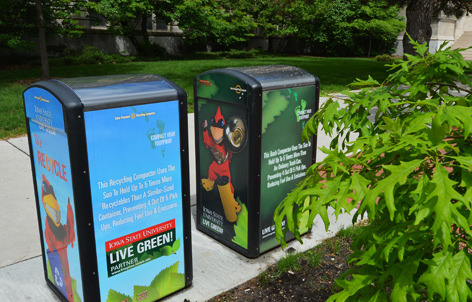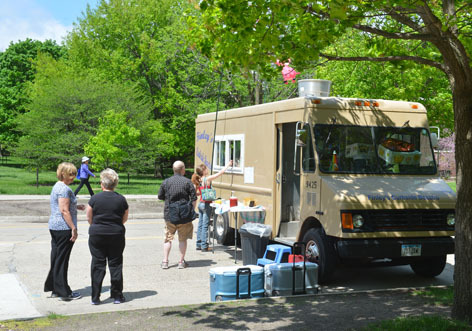Solar-powered recycling units join trash compactors

A new blue recycling unit and older green trash compactor near Beardshear Hall are among five dynamic duos of solar-powered technology on central campus. Photo by Bob Elbert.
A new breed of BigBelly solar receptacles have been installed in several central campus locations. While the latest BigBellys resemble their trash-compacting cousins, they're recycling bins, not garbage containers.
The five new recycling units are near The Hub, Memorial Union and Curtiss, Beardshear and Kildee halls. Each new unit is situated next to a trash compactor.
Pause before you pitch
"Before tossing everything into the trash, we hope people will take a moment to see if they're pitching things that could be recycled," said director of sustainability Merry Rankin.
Basically, the receptacles are for glass, plastic and paper. Much of the typical campus "trash" -- for example, newspapers, plastic "clamshell" food containers and glass, plastic or metal beverage bottles -- can be recycled, Rankin said.
There are a few items, however, that Rankin said should be trashed rather than recycled. These include food and permeable plastics or paper that have become wet or contaminated with food (think cheesy pizza boxes, coffee containers from ISU Dining or sandwich wrappers).

"A beverage or food container that is basically empty, but hasn't been rinsed out, is fine," she added. "If you're unsure about plastics, look for the 'chasing arrows' recycling symbol.
Like the trash compactors, the recycling units have solar-powered smart technology that keeps facilities planning and management staff informed about how the machines are doing. FPM staff need only go online to determine if a unit is working properly or if it needs to be emptied.
Recyclable items are turned over to Waste Management, a national provider of recycling and waste diversion services.
Compactor count
ISU's first solar trash compactors arrived in 2009. Today, there are 46, with seven more coming this summer.
The recycling units are a pilot project that began shortly before Veishea. So far, so good.
"All the BigBellys were full after Veishea and there were no problems," Rankin said.
The new units cost about $5,000 each (including "wraps" and placement costs) and were funded collaboratively. The vice president for business and finance office, the sustainability office and FPM each purchased a unit and the Government of the Student Body purchased two.
Student drivers
"Many of the green activities on campus are student-driven," Rankin said. "I'm proud that we have students who are so interested and active in advancing sustainability on this campus. When they leave here, it is exciting to think they will carry that passion and stewardship into their careers, communities, and homes."
Lunch ... on the go

Finley's Curbside Beastro food truck parks at the intersection of Stange Road and Osborn Drive. Photo by Bob Elbert.
Campus diners have a new lunch option, via a mobile food truck that parks near the intersection of Stange Road and Osborn Drive.
Arlo Meyer, assistant vice president for business services, said it is a pilot project of sorts. The intent is to alleviate capacity issues faced by rising enrollment numbers and respond to increased demand, particularly over the noon hour. After months of discussion, a request for proposal (RFP) was initiated at the request of the Office of the Senior Vice President for Business and Finance, putting a truck on campus a few weeks ago.
"We've been talking about this for some time," Meyer said. "This is a trial both for ISU and the food vendor to see if it works well."
Unique menu items
- The Elvis: Hamburger with peanut butter and crumbled bacon (grilled bananas are optional)
- Blue Moon: Hamburger with blue cheese and bacon
- Southwest Chicken: Mesquite smoked chicken breast with red cabbage and chipotle mayo
- SW Iowa Dog: Bacon-wrapped hotdog, deep fried and covered with red cabbage and chipotle mayo
Finley's Curbside Beastro offers hot food items, such as burgers, smoked chicken sandwiches, grilled cheese, regular or deep-fried hot dogs, and fries. The Huxley-based business, operated by Tim Little, also offers specialty items (like the "hippy burger," a fried portabella mushroom cap with blue cheese and pesto sauce), weekly/daily features (for example, a pulled pork sandwich with potato salad), drinks, chips and fruit.
It is open weekdays, from 11 a.m. to 2 p.m. Diners can pay with cash or credit cards, but the truck is unable to accept CyCash. Sandwich prices range from $3 to $6; drinks are $1. The food truck began operation a few weeks ago, and will serve from the same location into the fall.
"We built in some flexibility to the contract," said Cory Harms, associate director of purchasing. "He'll be operating as long as the weather is cooperating."
Harms said the university's RFP had an option for two food truck locations (the other was near the Marston water tower). Other food vendors expressed interest, but did not submit a bid. He said the university receives a small percentage of revenue, used to cover parking and cleanup costs.
"This is the first time we've done something like this on campus," Harms said. "We'll see how it goes. We may bid another location next year if this one is successful."
Rolling out the welcome mat for orientation
Beginning today and continuing through July 1, staff and faculty across campus will welcome an anticipated 5,800 would-be freshmen to campus for a two-day orientation experience. Staff in New Student Programs added two orientation sessions this year to accommodate the additional students, roughly a 10 percent jump over last year's orientation participants.
Program director Liz Kurt said her staff prefers to cap participation at 300 families or fewer for each session in order to provide the best possible experience – thus the additional sessions. "We think that's our threshold for giving families quality customer service," she said.
Students attending orientation have accepted an admissions offer to attend Iowa State and paid a matriculation fee, but that may not mean it's a done deal. Kurt said there's no method for capturing exact data, but "we know some of them arrive still shopping." She said the little things all employees can do for campus visitors – open a door, be welcoming, offer directions, answer questions – are more important than ever.
Orientation students will be identifiable by their red cinch bags.
What they'll get done
While they're here for orientation, students meet their academic advisers and register for fall classes, get their ISUCards and email accounts, and learn more about their home college. They'll be introduced to academic support services and social resources available to them.
There are opportunities to meet with a financial aid adviser and join a tour of campus, the library, residence halls or Greek housing network. They'll hear the fight song, discover how a learning community can help them be successful and find strategic locations for a cup of morning joe.
Students attending orientation will check in at the Hixson-Lied Student Success Center on the east side of campus. Those overnighting on campus will be assigned rooms in Maple Hall. The Union Drive Community Center is the site for guests' evening meal and the Memorial Union is the hub for evening programs. During the day, college and student service buildings will be used for workshops, large group presentations and other activities.
Orientation sessions for transfer students arriving this fall are scheduled for May 29 and July 1.
Inside headline
Iowa State researchers have received two, $100,000 grants from Grand Challenges Explorations, an initiative funded by the Bill & Melinda Gates Foundation. The grants provide funding for individuals worldwide to explore ideas toward solving persistent global health and development challenges. Initial grants of $100,000 are awarded twice a year. Successful projects have the opportunity to receive an additional grant of up to $1 million.
Drug delivery platform could improve lives of millions
Bryan Bellaire, assistant professor of veterinary microbiology and preventive medicine; Richard Martin, professor of biomedical sciences, and Balaji Narasimhan, associate dean for research, Vlasta Klima Balloun Professor of engineering and an associate of the Ames Laboratory, will pursue an innovative global health and development research project titled “Single Dose Therapies Against Human Filarial Diseases.” They will study a drug delivery platform that could dramatically improve the lives of millions of people suffering from river blindness, elephantiasis and soil-transmitted helminth diseases.
Portable seed cleaners for Ugandan farmers
Margaret Smith, Value Added Agriculture Program extension specialist; and Tom Brumm, associate professor of agriculture and biosystems engineering, will use their grant to research the use of portable, hand-operated seed cleaners for Ugandan farmers, who are primarily women. Smith has been working with the farmers on soybean production for the last two years. The crop, which was not widely grown in Uganda, is now providing improved nutrition for rural families and an additional cash crop for small-scale farmers.
The women currently winnow the soybeans by blowing on the grain as it falls to the ground, which is laborious and has caused allergic reactions to the dust and chaff. This study will evaluate the effectiveness of using a seed cleaner that could be purchased and shared by groups of farmers.
Iowa State mechanical engineering students developed the seed cleaner with input from Ugandan farmers. Smith and Brumm will work with several Ugandan partners to manufacture, distribute, evaluate and train students to repair the seed cleaners. In addition, the project will help farmers get agricultural loans and identify groups willing to purchase the seed cleaner.
The Iowa State projects are among 58 Grand Challenges Explorations grant awards announced May 21 by the Bill & Melinda Gates Foundation.
